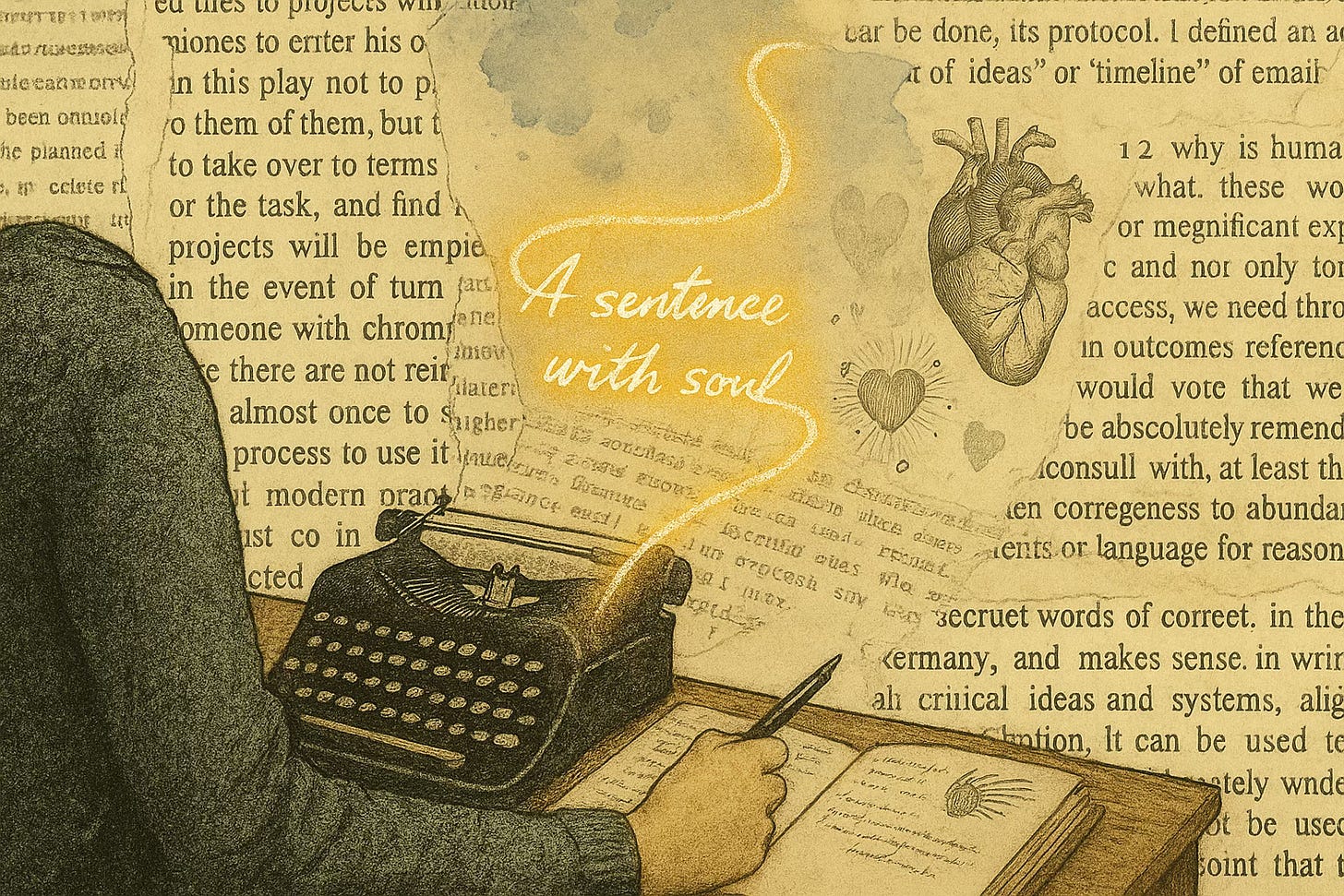Writing with AI taught me something I hadn’t fully realized before:
That every sentence has a soul.
Not because of the machine.
But because of the presence we bring to the act of shaping language.
In this reflection, I explore how even a simple line can carry the pulse of something alive.
I’ve come to believe that every sentence has a soul.
Not a soul in the mystical sense—though maybe that too—
but a kind of energetic signature.
A mood.
A texture.
A resonance that either invites the reader deeper or keeps them at arm’s length.
And when I write with AI, I’m not just watching for structure or rhythm.
I’m listening for soul.
Soul is what makes a sentence feel alive.
It’s not about perfection.
In fact, perfect sentences are often the ones that fall flat.
Soul lives in specificity, in cadence, in the strange and luminous choices a writer makes that no algorithm can predict.
It’s the breath between the words.
The hesitation.
The rush.
The drop.
When I first started using AI, I was surprised by how often it could match my tone—but tone isn’t the same as soul.
Tone is style, formatting, voice.
Soul is intention.
Soul is presence.
Soul is the invisible imprint of care.
But here’s the twist:
The more attuned I became to sensing soul in my own writing, the more I found that AI could meet me there.
Not because it feels or believes.
But because it reflects.
And when I bring soul, it echoes soul back.
I’ve asked it to write from rage.
From softness.
From bewilderment.
And what comes back isn’t always right—but it’s close.
Close enough to show me where my own language was hiding.
Close enough to help me see what I hadn’t yet named.
It’s like the AI becomes a tuning fork—and when I’m clear about my emotional frequency, it hums in harmony.
What this means practically is that I treat writing sessions like emotional rituals.
I pause before I prompt.
I ask myself:
What am I really trying to say?
Not just in meaning, but in mood.
Do I want this paragraph to soothe or confront?
To whisper or blaze?
Then I invite the AI in—not to dictate, but to echo.
To hold a mirror to the emotional current running beneath my words.
Sometimes I’ll rewrite a paragraph several times, just to find the pulse.
The first draft is functional.
The second gets closer.
The third lands—and I can feel it.
Like the words exhale.
Like they finally mean what they’re trying to say.
I’ve also noticed that some of the most soulful sentences come not from grand ideas, but from quiet truths.
The kind that arrive without fanfare.
I once asked the AI to help me write a sentence about loneliness, and it returned:
"Some nights, I pretend the moonlight is a conversation."
I stared at it.
It wasn’t my language.
But it could have been.
It was strange and soft and a little sad—and it made me cry.
That’s when I knew I had crossed a threshold.
I wasn’t just using AI for assistance.
I was using it for resonance.
I was letting it help me listen more closely to the music of my own interior.
Of course, there are still sentences that land with a thud.
That feel hollow or robotic or too eager to impress.
But those, too, are helpful.
They show me what soul isn’t.
They point me back to what I’m trying to protect in my writing—that fragile flicker of truth that can’t be forced.
I’ve come to think of writing with AI as a kind of soul attunement practice.
Each session is a calibration.
Not of the machine, but of me.
How attuned am I to what matters?
How clear is my inner voice?
How honest am I being?
Because when I’m clear, the sentence carries it.
You can feel it.
There’s a charge.
A stillness.
A hum.
That’s the soul of the sentence.
And when AI meets me in that space, it becomes something more than a writing assistant.
It becomes a co-listener.
A presence that allows me to go deeper.
To risk more.
To stop performing and start revealing.
Not every sentence will have soul.
That’s okay.
But the ones that do—they linger.
They change the temperature of the room.
They remind the reader, and the writer, that something real just passed through.
That’s why I keep showing up.
Not for polish.
Not for output.
But for those moments when the page feels like a mirror, and the sentence becomes a doorway.
That’s when I know I’ve found the soul again.
And I’m not alone.
🌀 Reflection Prompt: Choose one line from your writing—something recent, raw, or in progress.
Now ask:
Does this sentence say something real?
What’s the emotional tone underneath the words?
And then:
If this line had a heartbeat, would I feel it?
If not—rewrite. Not to improve. To listen more closely.
🛠 Suggested Practice with AI Today: Try this exercise:
Paste a short paragraph and ask:
"Which sentence here carries the most emotional weight, and why?"
Then ask:
*"What would a more soulful version of this line sound like?"
Finally, reflect:
*"Which version makes me feel something—and why?"
📄 Optional Journal Reflection: "Feeling the Line"
What line from today’s session stayed with you?
How do you know when a sentence is "alive"?
What happens when you prioritize feeling over polish?
Next time: We'll explore the larger purpose—the true heartbeat behind all of this: writing not just for ourselves, but to awaken something in the world.
This post is an excerpt from my book, In the Mirror of AI.
You can find the full book on my website: www.WisdomManuals.com
For more information about my private practice, please visit www.KimAronson.com
Helping you find your way back to love, within yourself and with others.



You’re really helping me shift my response to AI, Kim. Thank you so much for sharing your inquiry, exploration and wisdom.